Ivan Dodig and Filip Polášek Upset Mektić and Pavić for Australian Open Final!
February 18, 2021 - Although it looked as if Mektić and Pavić would continue their incredible series to reach their first Grand Slam final and 13th consecutive victory, the excellent Ivan Dodig and Filip Polášek upset the Croatian duo to celebrate for a spot in the Australian Open doubles final!
Not only did the spectators return to the stands yesterday, but they witnessed a showdown of three Croatian tennis players for a place in the final of the first Grand Slam of the season!
The untouchables Nikola Mektić and Mate Pavić started the season very well, but in the end, it was Ivan Dodig and Filip Polašek to celebrate with 2-1 in sets (4-6, 6-4, 6-3).
The Croatian-Polish duo got revenge on Mektić and Pavić for the Antalya final, where the Croatian pair won their first joint tournament. However, it didn't look as though the 9th-seed would do it. Especially not after the first set in which Pavić and Mektić routinely won 6-4 in 40 minutes.
Namely, Mektić and Pavić took the first set after the break in the fifth game and held the lead to 4-4 in the second set, and then lost five consecutive games (up to 3-0 for Dodig and Polasek in the third set), which decided the match.
This is Dodig's first placement in the final of the premier Grand Slam tournament of the season, as he has so far lost twice in the semifinals (2015 and 2020). This is Polášek's first final in one of the four biggest tournaments. This is the second final for Dodig and Polášek this year after losing to Mektić and Pavić in the Antalya final.
Dodig and Polášek will play the winners of American Rajeev Ram / Briton Joe Salisbury - Briton Jamie Murray / Brazilian Bruno Soares in the final! Good luck!
To read more about sport in Croatia, follow TCN's dedicated page.
Turks Turning Old Zadar Maraska Building into High Category Hotel
February the 18th, 2021 - The old Zadar Maraska building which is well known all over Dalmatia and the rest of the country for its representation of 500 years of tradition is soon to become a high category hotel, with construction beginning this autumn.
As Morski writes, Zadar Mayor Branko Dukic recently met with the President and Chief Executive Officer of the Turkish Dogus Group Ferit F. Sahenko and his associates. The topic of conversation was the announcement of a new cycle of Dogus Group investments in the Dalmatian city of Zadar.
The Dogus Group is well known across Croatia for its numerous previous investments, and the conversion of the old Zadar Maraska building is sure to be a topic of conversation over the coming months.
''We're close to a partnership with a strong Croatian partner. We're planning to start the first phase of the hotel's construction in the autumn of this year. We're also finalising the blueprints for the living space around the hotel. We were pleased to be able to inform Mayor Branko Dukic about the further phases of the Maraska project,'' said the regional director of Dogus Croatia, Burak Baykan.
In addition to exchanging information on current projects for the development of Zadar's tourist offer and new business opportunities, the Mayor of Zadar expressed satisfaction with the announcement of the imminent start of construction of what will become highest category hotel in Zadar when completed.
''The City of Zadar, as an extremely tourist-oriented coastal city, urgently needs hotel accommodation of the highest category. I'm looking forward to the start of work on the future hotel in the old Zadar Maraska building beginning, which will confirm the correctness of the previous efforts of our city administration to attract new investments in the field of tourism, of which, I'm convinced, will be more and more.
We must continue to invest in our infrastructure, beaches, sport and recreational facilities, the restoration of cultural attractions and everything that will lead us raise the overall quality we can boast of and expand our range of destination products. All these efforts will contribute to the reduction of seasonality and create more new jobs. Zadar lacks accommodation in high category hotels and all investors whose projects can raise the value of Zadar's tourist product are ver welcome. The coronavirus pandemic will pass, people will start travelling again and it's up to us to welcome it and be read,'' Dukic concluded.
For the latest travel info, bookmark our main travel info article, which is updated daily.
Read the Croatian Travel Update in your language - now available in 24 languages.
Pula Aquarium and Valencia Institute Cooperate for Noble Pen Shells
February the 18th, 2021 - The noble pen shell, about which much has been written over recent years as they become more and more rare to come across, has seen an institute in Valencia and the Pula Aquarium, known for rescuing marine animals, team up to protect them.
As Morski writes, the Pula Aquarium has recently announced that in the future it will cooperate with the Institute of Environment and Marine Science of the University of Valencia (Instituto de Investigacion en Medioambiente y Ciencia Marina Universidad Catolica de Valencia San Vicente Martir (IMEDMAR-UCV)), ie, with dr.sc. Jose Tenom and Ph.D. Jose Rafael Garcia-March on the preservation of the beautiful and ever illusive noble pen shell (Pinna nobilis) in strictly controlled conditions (ex situ).
The mass mortality of these strictly protected and endangered noble pen shells began over in Spain back in 2016, and this sad situation has unfortunately also been witnessed here in Croatia, with some people even removing them from the sea to take photos with them, an act that is illegal and as such punishable.
The Spanish authorities reacted quickly to the issue they noted back in 2016 and an expert and scientific community was organised to preserve the shells. In addition, back during the middle of 2019, the Pula Aquarium, entirely on its own initiative, will start working on the conservation of the last specimens of this protected shell (with the permission of the competent Ministry), once again in ex situ conditions.
The cooperation between IMEDMAR-UCV and the Pula Aquarium is important for keeping the noble pen shell alive. As stated, the Pula Aquarium is no stranger to taking care of life in the Croatian Adriatic, rescuing and rehabilitating many a loggerhead turtle. Accordingly, it will contribute in this project with diligent work and the continuous improvement of techniques and methods, while IMEDMAR-UCV has all of the specific knowledge and experience in the field of larval and juvenile noble pen shell care.
For the latest travel info, bookmark our main travel info article, which is updated daily.
Read the Croatian Travel Update in your language - now available in 24 languages.
People Also Ask Google: What is a Typical Croatian Breakfast?
February 18, 2021 - Google knows what people are searching for, and there are clues in the 'People Also Ask' prompt. So let's start answering - what is a typical Croatian breakfast?
Having grown up in the US, I love breakfast. Not only is it the most important meal of the day, but it tastes good at any time of the day - and I've certainly had my fair share during lunch, dinner, and dessert. From pancakes, crispy bacon, home fries, and scrambled eggs at divey diners to eggs benedict brunch extravaganzas, breakfast is one meal America does right.
So, what do Croatians eat for breakfast?
Experiencing the breakfasts of my homeland, however, turned out to be a harsh reality I discovered on my first trip to Croatia in 1996.
Not yet six years old, I remember sitting in the kitchen of my grandparent's home in Kosa, a small village 15 minutes from Metković. My mother, the oldest of seven siblings, was back in the kitchen where she was raised before moving to Split at 16.
"Mama, I'm hungry," I said, familiar with mornings that included a variety of sugary cereals, chocolate milk, fresh-squeezed orange juice, or french toast.
A chewy loaf of white bread was presented before me, along with butter, pašteta, and rosehip jam. At least I had options.
Visiting Croatia as I grew older, and especially in my later teen years when indulging in Hvar town nightlife was a rite of passage among my paternal cousins; that soft loaf of bread, while nostalgic, wasn't going to cut it. We'd often find ourselves looking for anywhere that had a sign outside with the word 'omelet' (even though only cheese or ham was ever an option) and would beg for a morning order of fries on the side if only to desperately mimic the hangover breakfasts back home.
And if there was no omelet to be found? We'd hunt for the greasiest burek in town.
But that was well over a decade ago. While some Croatian breakfast staples have been maintained, many citizens (and restaurants) have evolved their morning routine to cater to breakfasts reminiscent of our western friends.
What is a traditional Croatian breakfast?
“Turkish coffee and a cigarette.”
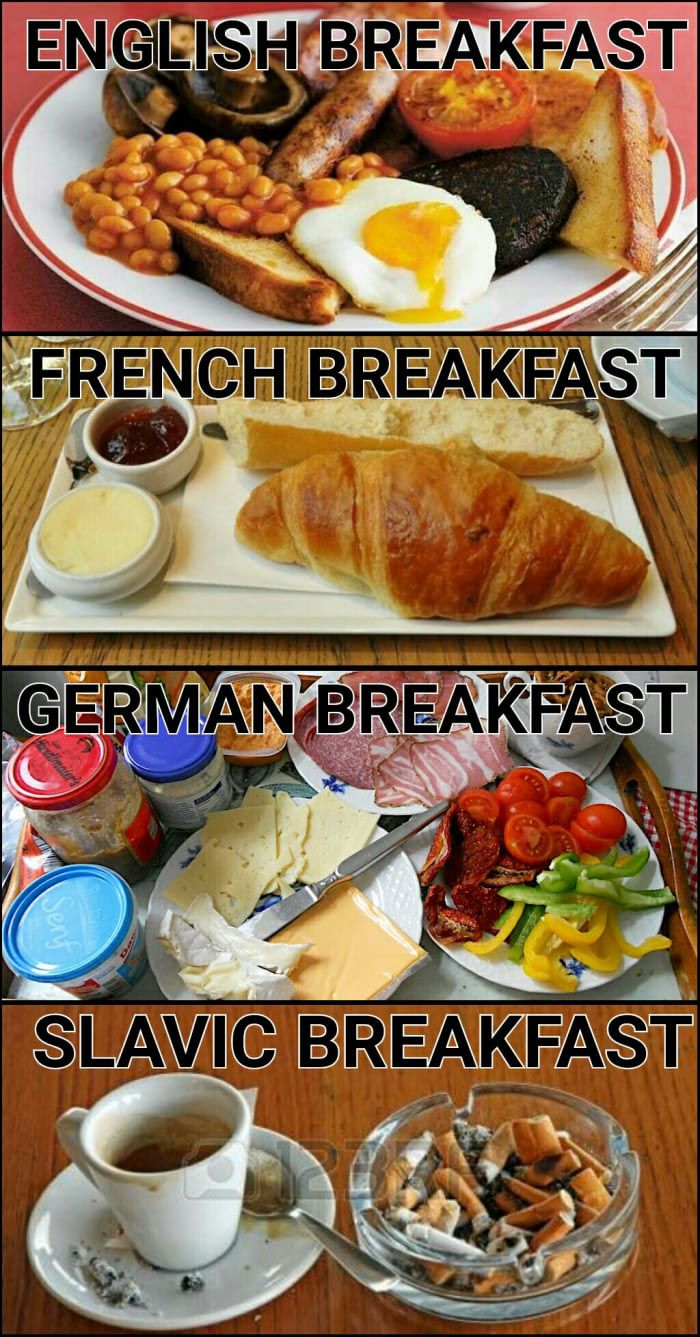
While it may be one of the most popular breakfasts among some Croatians, there are quite a few other traditional morning meals.
Like I mentioned above, Dalmatians are partial to cold cuts, cheese, pašteta, and bread. Some on the coast prefer to keep it light and will opt for anchovies instead.
It’s not unusual to find slimy pancetta or lard spread on bread in continental Croatia, pork-fat inspired dishes in northern Croatia, while the Istria region is famous for its asparagus and truffle frittata.
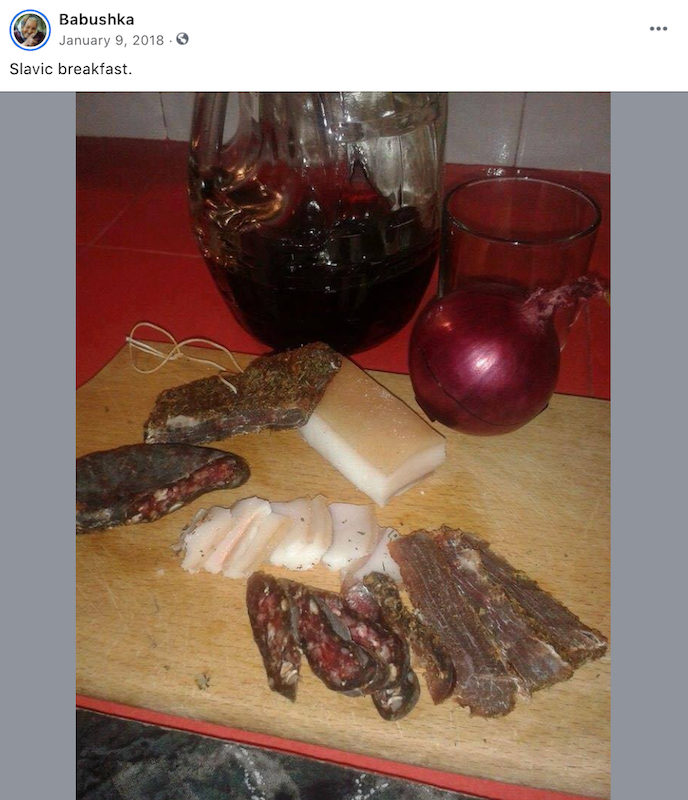
Your breakfast cold cuts may even be served with pickled onions or gherkins, a box of Napolitanke, Jadro, or holiday cookies defrosting from the freezer, but only one thing is certain - there is no breakfast in Croatia without coffee. Consider eating is a bonus.
What are Croatian breakfast pastries?
While we more or less covered some traditional breakfast items in Croatia, others may have never been intended for breakfast but are now enjoyed in the morning by both locals and tourists in Croatia.
Burek (with cheese) is by far the most famous. This Croatian classic is usually made with phyllo dough and cheese, while other fillings such as meat, potato, and spinach can also be found. A staple at most bakeries across the country, this cheap to-go treat can also be enjoyed with yogurt to ensure a hearty breakfast meal.
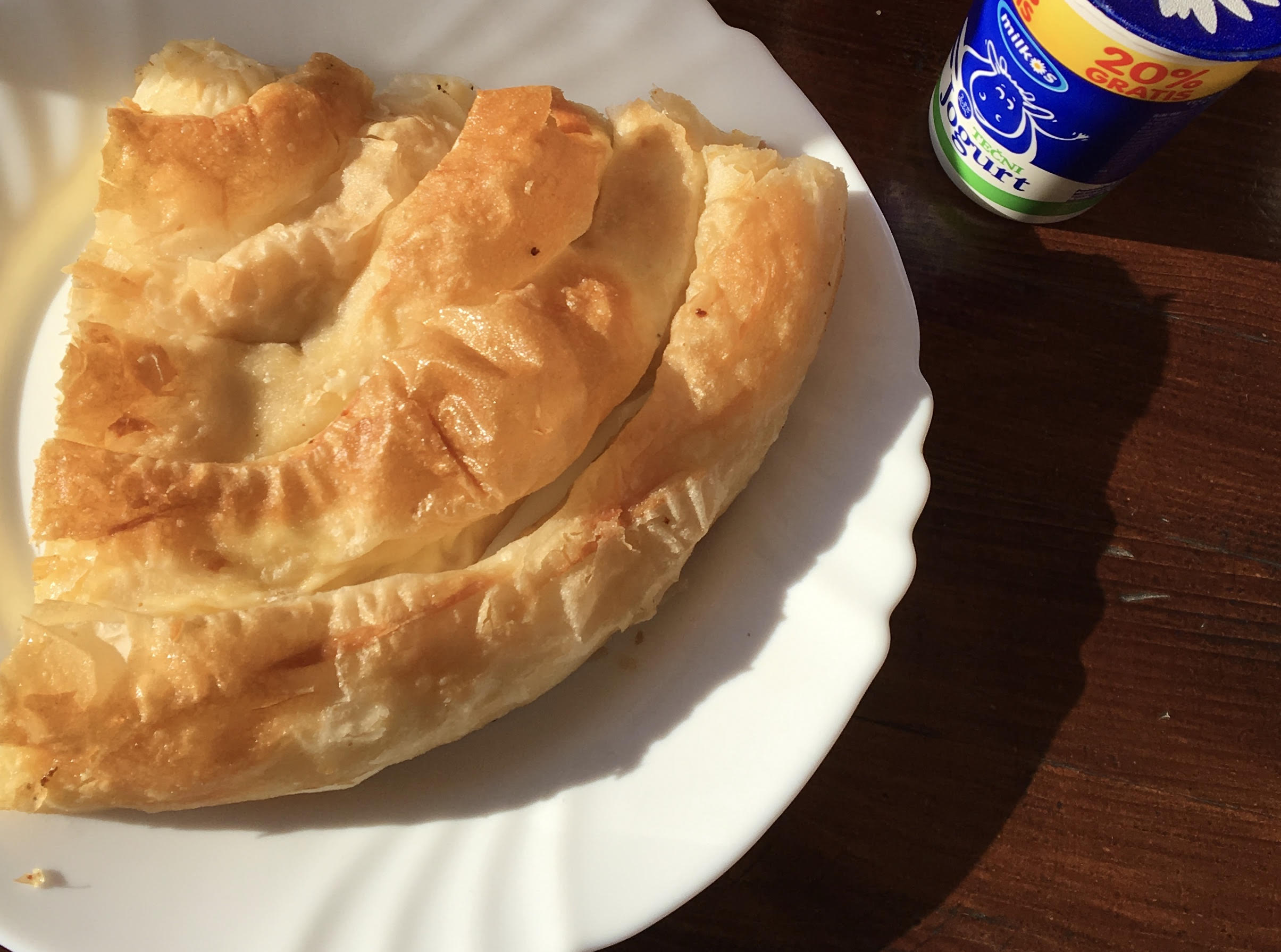
Unlike burek, bučnica is a strudel-like pastry containing pumpkin, cheese, butter, and eggs. Served with sour cream, bučnica is Croatian comfort food that even ticks off a few of the food groups!
Croissants, strudels, and various other Croatian cookies and pastries have made their way into our mornings and are often found for a few kunas at bakeries like Bobis, Dubravica, and the like.
What do Croatians eat on holidays? Croatian Easter breakfast
The holiday breakfast in Croatia that stands out the most is certainly Easter. Easter is a holiday with many breakfast traditions around the country, like cooked ham, boiled eggs, spring onions, radishes, and the sweet star of the show - sirnica (or pinca), a fluffy Croatian Easter bread topped with crushed sugar.
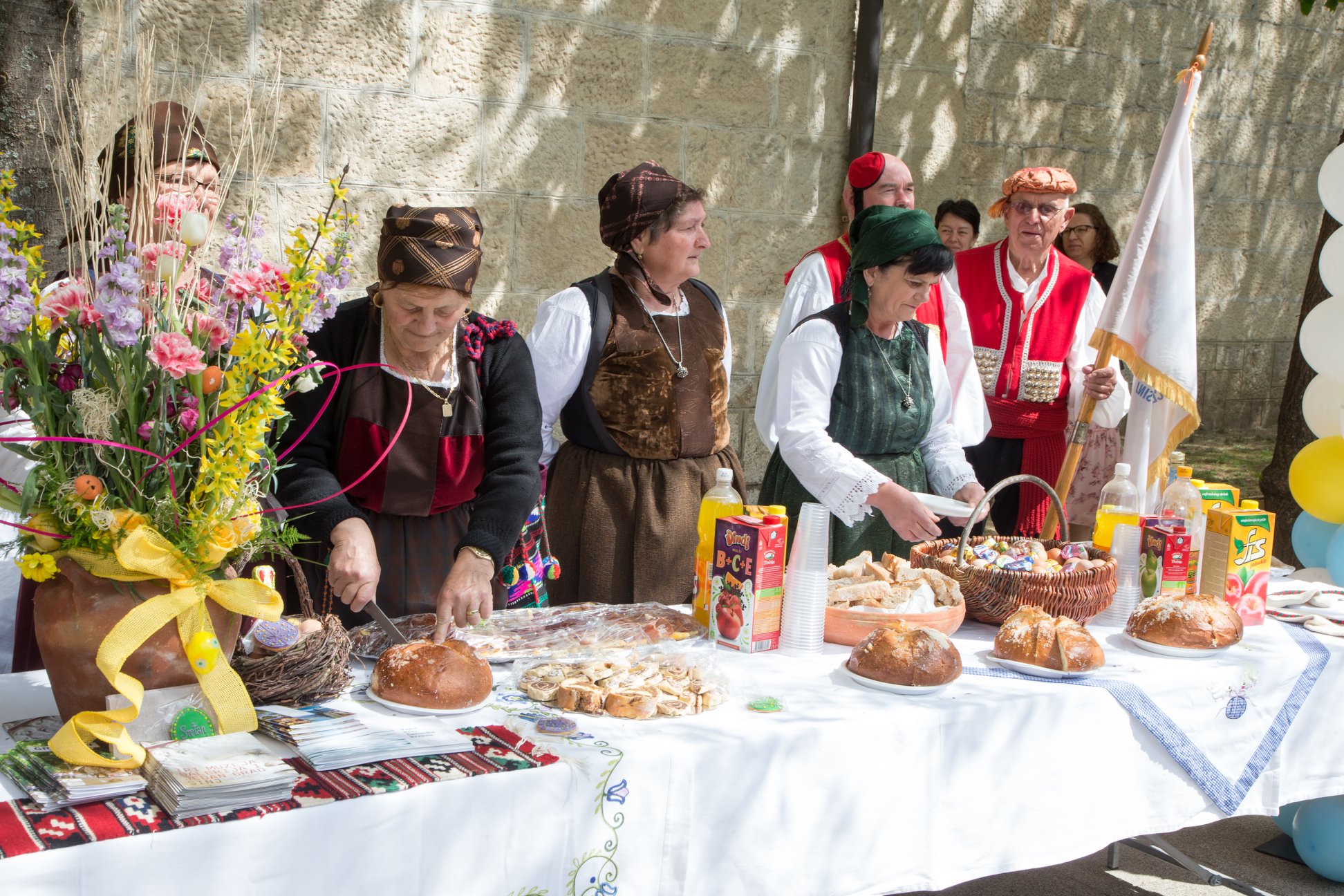
Easter in Sinj - Foto Žižić
Traditionally from Dalmatia, sirnica is a trademark of Croatian Easter tables today, so much so that bakeries around the country begin selling the bread months before the holiday - and some year-round!
What is a typical Croatian breakfast today?
It's 2021, so it's no surprise that Croatia's breakfast eaters have adapted to today's trends. Many children will have yogurt and a banana before school; others may enjoy a bowl of Chocolino cereal, while eggs have become much more commonplace on today's breakfast tables. Especially since so many have the luxury of fresh eggs from their farm or local farmer's market.
Restaurants around the country have matured as well, with many offering English breakfasts, eggs benedict, or poached eggs on avocado toast.
Some restaurants have even introduced breakfast burritos, others opened restaurants dedicated solely to eggs (Eggspress in Zagreb, for example), and bagels have even made their way here in the last couple of years!
And let's not forget about cold-pressed juices, smoothies, and acai bowls that can be found in Croatia's bigger cities, catering especially to Californian and Aussie travelers here on holiday.

Brasserie on 7 in Split
And to conclude - the best Croatian breakfast memes.
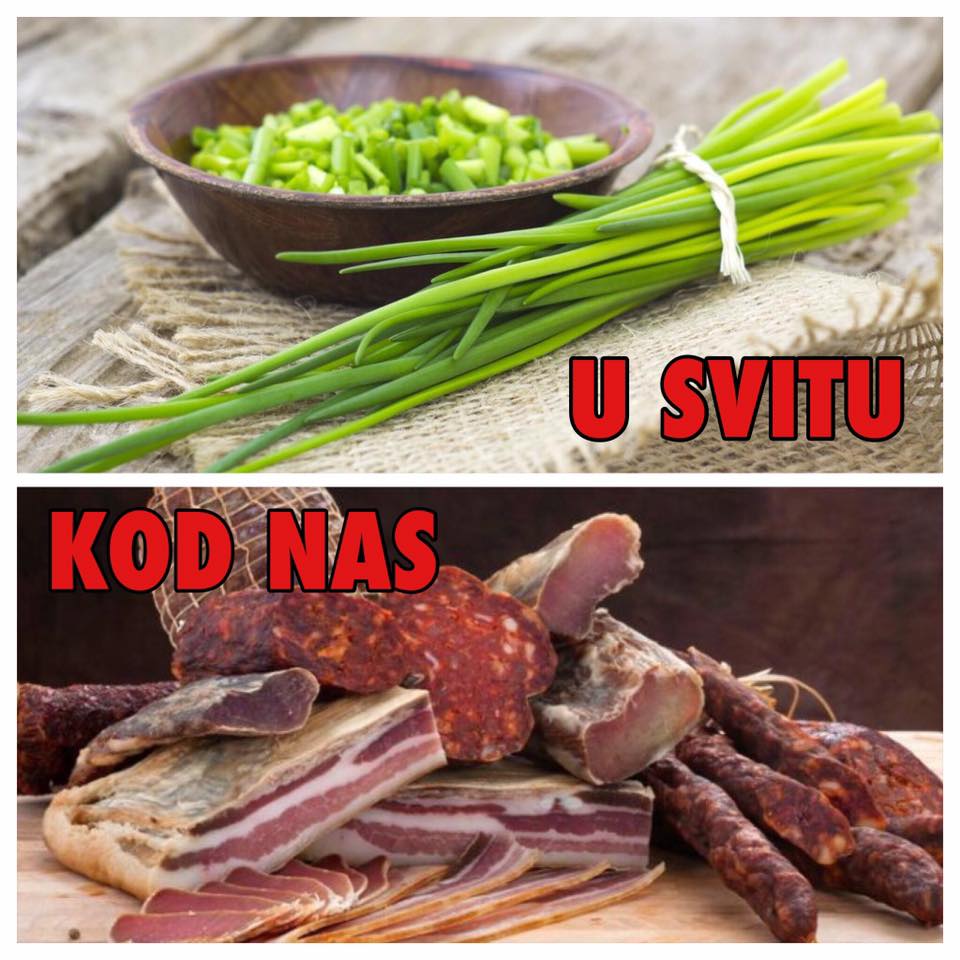
In the world vs in Croatia
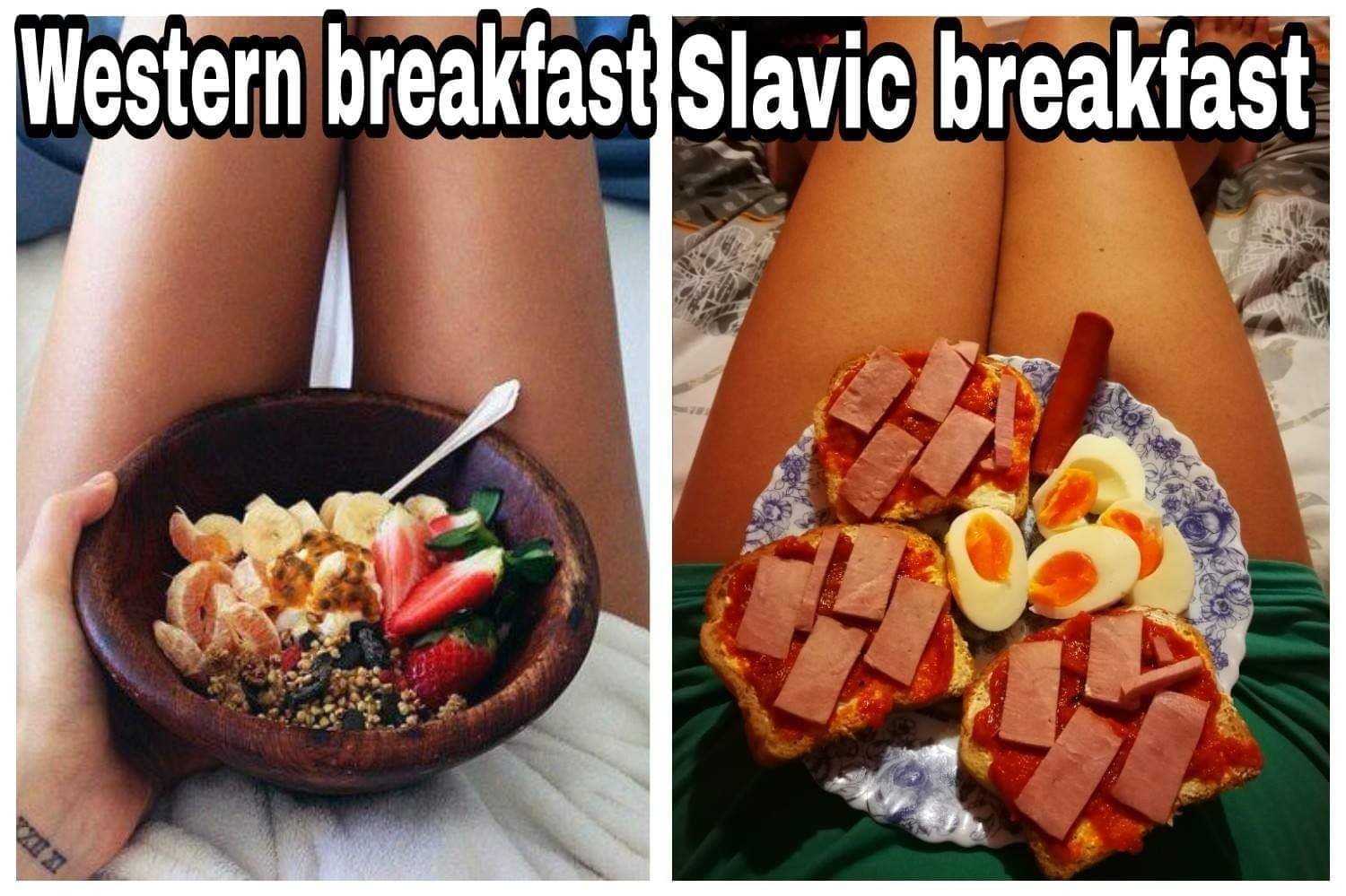
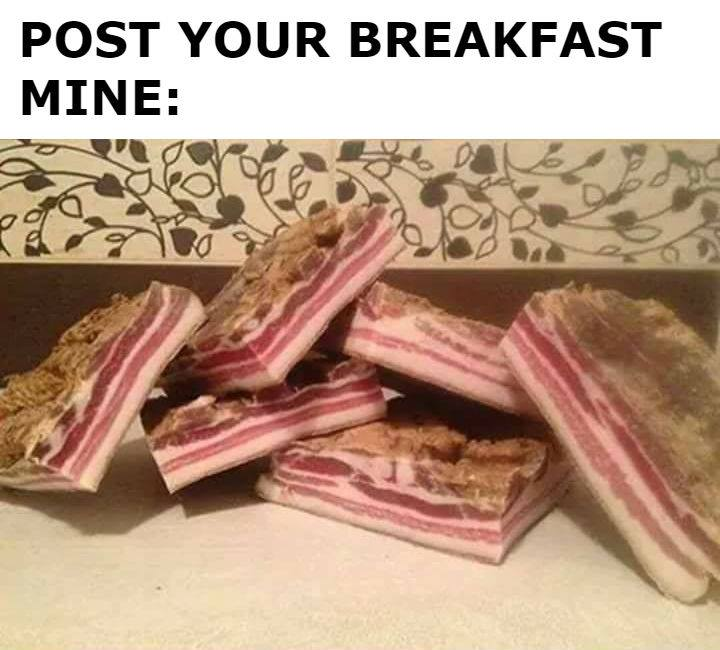
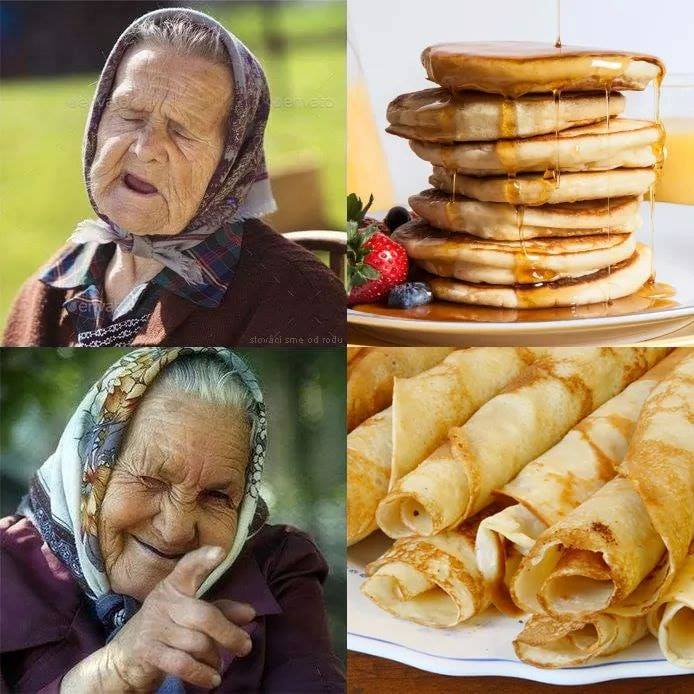
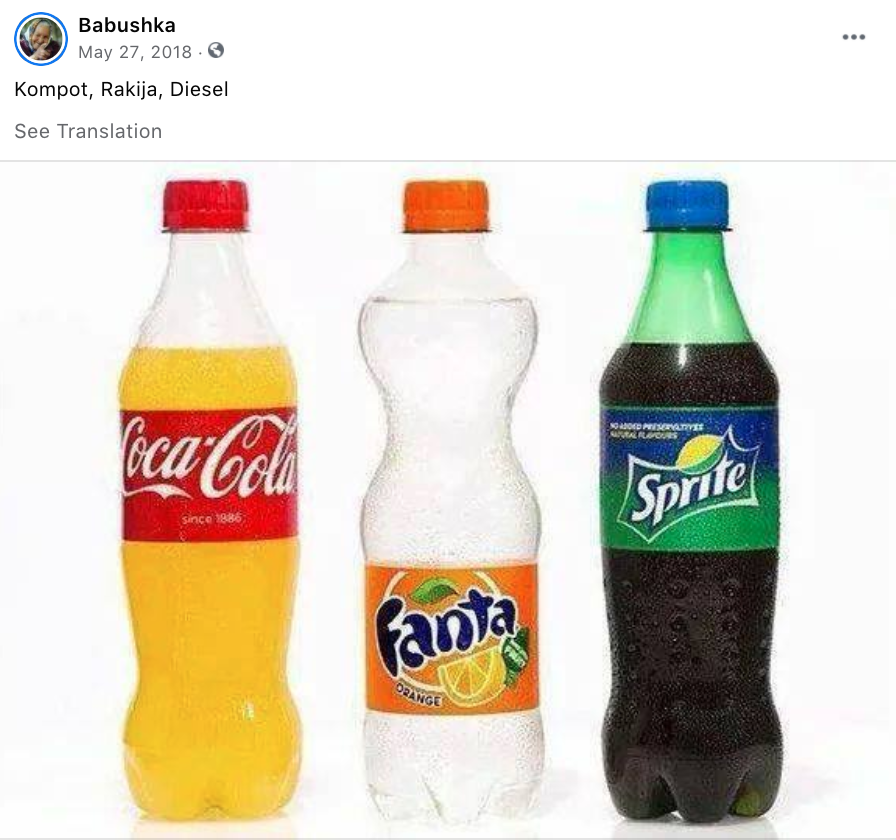
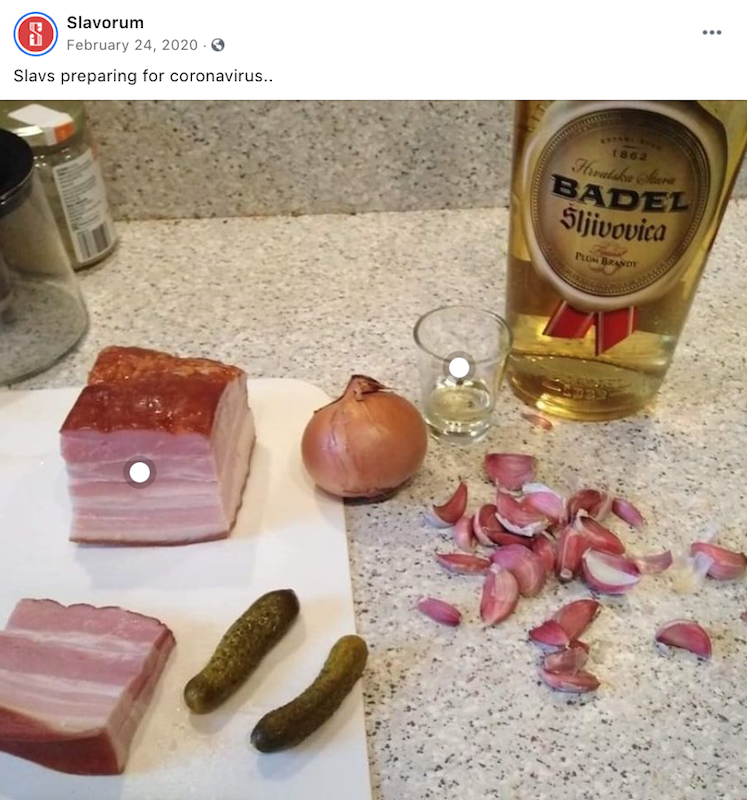
Whether you opt for sweet, savory, to something in between, breakfast in Croatia has it all.
Are there any Croatian breakfast tips and essentials we should add? Send us your info at This email address is being protected from spambots. You need JavaScript enabled to view it..
To follow the People Also Ask Google about Croatia series, click here.
Slavonski Brod Armed Robber Leaves Empty Handed After Shopworker's Refusal
February 18, 2021 – An astonishing end to a terrifying encounter caught on CCTV last night after a Slavonski Brod armed robber was forced to retreat by the brave refusal of a shop worker. She simply told him no.
Last night saw an astonishing end to a terrifying encounter in a shop in Slavonia. Under the cover of darkness and with a hood and mask covering his face, a young man entered the shop, pointed a gun at the lady working there and demanded to be given the store's takings. But, the Slavonski Brod armed robber left empty-handed. The shopworker simply refused to give in to the threat.
Nobody knows for sure what they would themselves do under such circumstances. And, perhaps that's also true of Snježana Iličić, the shopworker who faced the Slavonski Brod armed robber. But, when a confrontation most would find terrifying visited her, she remarkably kept her cool. “I won't,” she said to the Slavonski Brod armed robber, “I don't give money.”
The incident was caught on the shop's CCTV and broadcast alongside an interview with Snježana, her husband and members of the Slavonski Brod community on Croatian TV channel RTL.
“I looked him in the eye and saw he was holding a gun and (I asked him) 'Why?' Snježana told RTL's reporter. To her question, the Slavonski Brod armed robber replied, “Get the money out! This is no joke.”
“I said no”, Snježana recounts. The Slavonski Brod armed robber repeated his demand, “I told you to take the money out.”
“I won't,” she told the gun-toting man. “I simply did (just) that. I don't know... at that moment, that's (just) how I felt. And that's how it turned out."
In the CCTV footage, you can see the Slavonski Brod armed robber looking confused at the brave and barefaced shopworker's response. Eventually, he relents, gives up and simply walks back out of the store.
Snježana told RTL she had not felt a shred of fear during the encounter. It wasn’t until the attempted armed robber had left the store that she was overcome by the stress and shock of the incident. She called the police and then her boss. Snježana is not the shop owner, she only works there. Everyone in Snježana's family is proud of her, as are members of the local community who were interviewed later in the news item. The shop, which is in Bukovlje, Slavonski Brod is open as usual again today, but the owner has given Snježana time off for a well-deserved holiday.
The Slavonski Brod armed robber was caught by police not long after Snježana called them. He was found to be 22-years-old and the media reports that he has no previous convictions for anything similar. He faces up to 12 years in prison, depending on the details of the weapon he was brandishing.
Building Bridges Between Croatia, Bosnia and Serbia
February 18, 2021 – Appropriate government bodies of the three neighbours have come together and agreed to work together to improve bridges between Croatia, Bosnia and Serbia
We say building bridges between Croatia, Bosnia and Herzegovina and Serbia. It's actually more a case of renovating and maintaining bridges between Croatia and the two neighbours to the east.
Despite what journalist Zdenko Jurilj describes as “constant political skirmishes” between the neighbours, in Vecernji List's coverage of this news, the Bosnia and Herzegovina Council of Ministers and the governments of Croatia and Serbia have reached an agreement to work together in the rebuilding, maintenance and review of bridges which connect them. According to the signed agreement, each party will share 50% of the costs without, as it says, "claiming compensation from the other party, unless otherwise agreed between them."
In other words, the cost of renovating bridges between Croatia and Bosnia will be half paid by Bosnia, half paid by Croatia, the cost of renovating bridges between Bosnia and Serbia will be half paid by Serbia, half paid by Bosnia.
According to the agreement between the three governments, equipment needed for the reconstruction and maintenance of the bridges will be exempt from customs duties. Bridge managers shall make a detailed inspection of each of the bridges at least once every five years and independent experts appointed by the bridges' trustees will inspect them each year.
There are 10 bridges between Croatia and Bosnia and Herzegovina which will be jointly maintained. Most of them stretch between the countries across the Sava river, although a few cross over the Una, Maljevac and Korana rivers. A further 11 bridges between Serbia and Bosnia are within the agreement, making a total of 21 bridges to exist within the deal.
Although there are bridges between Croatia and Serbia (including at Ilok and Erdut in Slavonia), within the article published by Vecernji List there is no mention of an agreement to improve bridges between Croatia and Serbia. Following the optimistic and uplifting promise of the headline at the start of this news item, this fact is a rather more unfortunate metaphor on which to end it.
For the latest travel info, bookmark our main travel info article, which is updated daily.
Read the Croatian Travel Update in your language - now available in 24 languages
Plenković: Croatia Holds Initial Talks on Russian Vaccine, Waits for EMA's Approval
ZAGREB, 17 February 2021 - Prime Minister Andrej Plenković said on Wednesday the government had held initial talks with the Russians on the Sputnik V COVID-19 vaccine.
If that vaccine is approved by the European Medicines Agency (EMA), we want to be in the position to make up for the current lack of vaccines, he told the press when asked if Croatia, like Hungary, would introduce Sputnik V.
Lots of cacophony concerning the Russian vaccine in the media
Noting that there was lots of "cacophony" concerning the Russian vaccine in the media, Plenković said that in recent months the government had been working on ensuring sufficient COVID vaccines for the whole population, as was its responsibility.
He mentioned 1.9 million doses of Pfizer's vaccine, a million doses of Moderna's, 2.8 million of AstraZeneca's and 900,000 of Johnson & Johnson's vaccine, which he said had started the registration procedure given that all vaccines were verified by the EMA.
"Croatia is a member of the European Union. The procedure of protecting the health of our fellow citizens is additionally strengthened by the fact that all medicines and vaccines arriving on our market pass through the filters and controls of the European Medicines Agency, and the Croatian Agency for Medicinal Products and Medical Devices (HALMED) participates in that."
He said Croatia was now in the position that, through no fault of its own, the distribution of the vaccines had slowed down at EU level. Therefore, he added, the government wants to see the options for the possible procurement of vaccines, like Sputnik V, that may be available.
Plenković said the foreign and health ministries would put questions and demands to the Russians, adding that Russia was in contact with the EMA at the level of a scientific committee and that HALMED would be involved.
"If it happens that Sputnik gets the EMA's approval at the same time, we want to be in the position to have reserved certain doses on time so that we can de facto fill the gaps that currently exist, although the announcements... for the end of February and March are good, about 600,000 vaccine doses, and much more in April and May."
Plenković said the government wanted to be responsible regarding people's health and safety. He elaborated that when a vaccine or medicine approved by the EMA was "available on the Croatian market, the manufacturer is responsible for its quality or possible side effects."
"But if medicines are without certificates, then the state is responsible, and we definitely don't want to be in the situation to have on the market something that hasn't been checked and isn't reliable."
Marko Livaja Returns to Hajduk after 11 Years!
February 17, 2021 - Croatian striker Marko Livaja returns to his hometown club, Hajduk Split!
Marko Livaja returns to Poljud! The experienced 27-year-old striker returned to the Split club after 11 years and signed a contract with Hajduk until the end of the current season after terminating his contract with the Greek first league team AEK.
After many years, Marko will fulfill his great wish and boyhood dream to play an official match for Hajduk's first team. He made six appearances for Hajduk, but all in friendly matches.
In 2010, as a sixteen-year-old, he left Hajduk for Inter Milan, where he played 13 official matches and scored four goals.
In the meantime, he played for Swiss Lugano, Italian clubs Cesena, Atalanta, Empoli, Russian Rubin Kazan, Spanish Las Palmas, and Greek club AEK from Athens, for which he played for the past two seasons and collected 147 official appearances with 42 goals scored.
Livaja played for all the younger selections of the Croatia national team, while he made a total of four appearances for the first team.
"I am happy to be back home after so much time, and I am looking forward to new opportunities and challenges here. I am glad that I will try to achieve goals with my beloved club, and I hope for better results," said Marko after signing for Hajduk.
"Marko, welcome back to Hajduk, and we wish you good luck and success in the white jersey!" Hajduk concluded in its official announcement.
To read more about sport in Croatia, follow TCN's dedicated page.
Production Halted in Osijek Sugar Factory, Županja Plant Only One to Continue Working
ZAGREB, 17 February 2021 - The Croatian Sugar Industry (HIŠ) company confirmed on Wednesday that this year sugar would be produced only at the Županja sugar factory while the sugar factory in Osijek would cease production after the factory in Virovitica halted production.
HIŠ management board chair Željko Zadro said that of the 202 workers of the Osijek Sugar Factory, 81 had already agreed to the termination of their contracts and would receive severance pay. Talks are underway with some of the workers to continue working at the Županja factory, while some 30 workers will continue working in the Osijek factory's warehouse, bakery and silo, while some might find employment in the Žito Group, which owns the Osijek Sugar Factory.
HIŠ was founded in 2019 as a result of the merger of the sugar factories in Osijek, Virovitica and Županja.
Asked by reporters if this was the end of the sugar industry in Croatia, Zadro said that "it's a miracle we survived until 2020."
"Halting sugar production in Virovitica and Osijek was a difficult decision but it is the only one that guarantees that we will keep sugar production running in Croatia. Had we not made it, all three sugar factories would be closed next year," he said.
Zadro recalled that last year there were problems with contracts for the sowing of sugar beet, with contracts having been signed to sow sugar beet on around 10,500 hectares in Croatia and 1,500 hectares in Hungary.
He said that HIŠ warned at the time that the area sown with sugar beet would suffice to keep only one sugar factory running but that HIŠ would invest additional effort to make it through another year.
"We hoped that sugar prices would rise, that contracts would be signed for more hectares but unfortunately, the harvest is near and none of that has happened. Since 2014 all three sugar factories, in Virovitica, Osijek and Županja, have lost about a billion kuna. We simply had to do this... to at least keep one factory running," said Zadro.
He noted that the British LMC company, the world's best known consultant for the sugar industry, had suggested that production costs would be the lowest at the Županja factory.
He could not say if, considering the situation on the market, the suspension of production in Osijek was for good.
"We do not know if an agreement with Mercosur countries will be signed, to enable the import of raw sugar in Croatia, which would make it possible to open all three factories. It's difficult to say what will happen, we have to be flexible and adapt to the situation but unfortunately we no longer have any reserves," he said.
Asked what should be done to increase sugar production in Croatia, Zadro said that in the old EU member countries an average 18,000 hectares of land is sown with beet per factory, while in the new EU members the average is 12,000 hectares, and he believes that with 12,000 hectares of land sown with sugar beet in Croatia and Hungary, Croatian factories could have a certain future.
Asked if the sale of factory premises in Virovitica and Osijek was being considered, Zadro said that the infrastructure in question was large and that it required careful consideration of steps to be taken next.
"You can start any production here because it can develop considering the available infrastructure. I do not know the answer to that question for now, and we have not discussed the topic with anyone yet," he said.
Ministry Issuing Food Waste Prevention Instructions for Sectors
ZAGREB, 17 February 2021 - The Agriculture Ministry said on Wednesday that it had published instructions for the prevention and reduction of food waste in the retail and hospitality sectors and that similar instructions for primary production and food processing would be published by the end of the year.
The instructions on the reduction of food waste in the retail sector are designed to help retailers and other sector stakeholders understand how food waste is generated and to offer solutions on how to improve operations and reduce the amount of food waste.
The instructions for the hospitality sector are intended for restaurants, hotels, and canteens as well as public sector kitchens, such as those in hospitals, schools, kindergartens and faculties, which also prepare and serve food.
The purpose of the instructions is to help companies and individuals change their approach to handling food, the ministry said, noting that instructions for primary production and food processing would be made public by the end of the year.
Croatians waste 97 kg of food per capita annually
The ministry said that around 88 million tonnes of food is wasted in the EU every year. Rough estimates, which are based on available information on waste management in 2017, show that 399,611 tonnes of food is wasted in Croatia annually, or 97 kilograms per capita.


